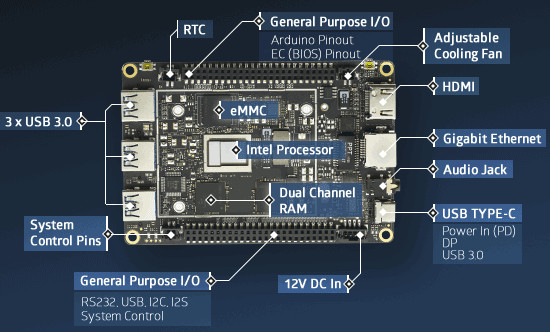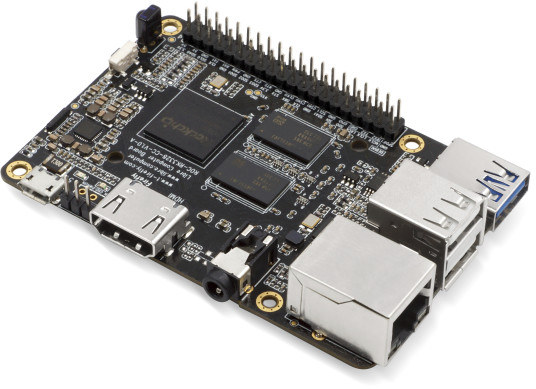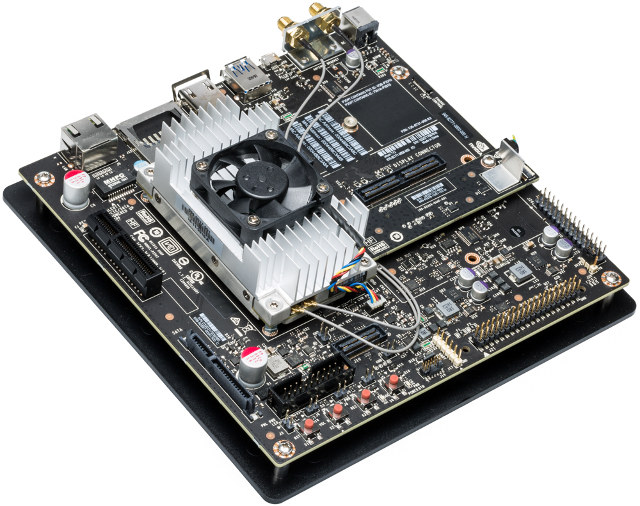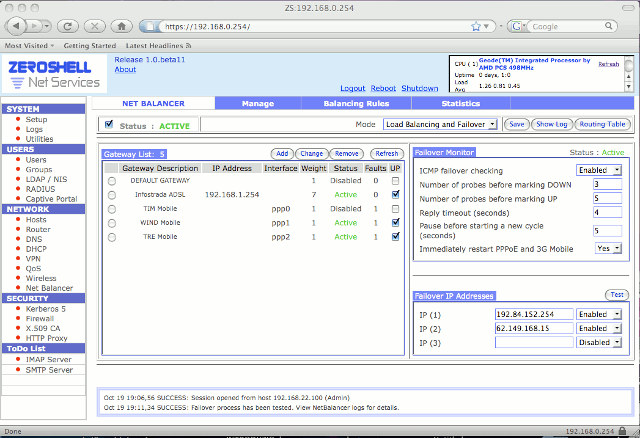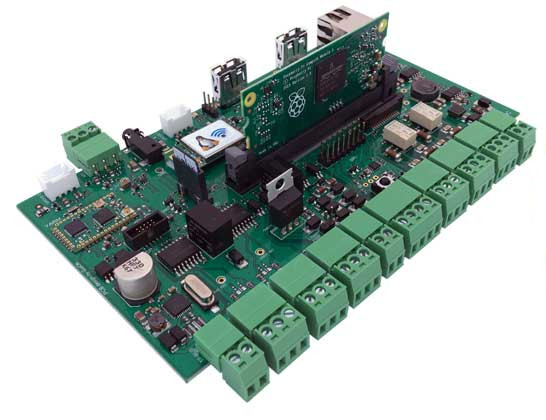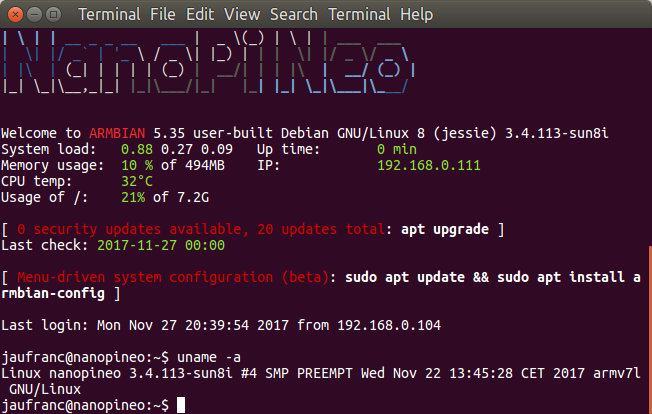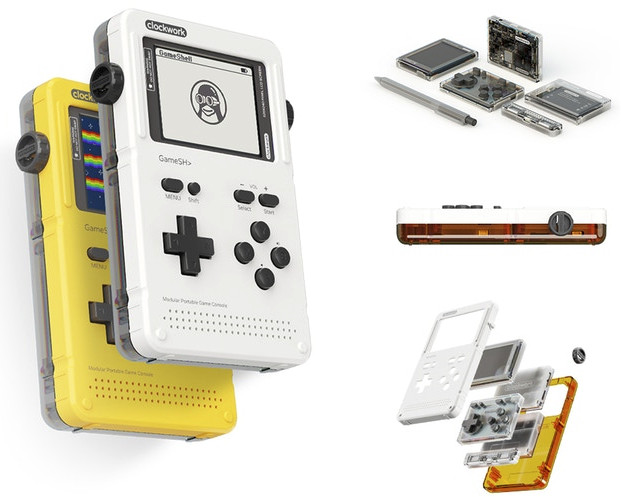LattePanda development board based on Intel Atom x5-Z8300 “Cherry Trail” processor was launched nearly exactly two years ago on Kickstarter. The board also included an Atmel MCU for Arduino compatibility, and contrary to most development boards on the market, focused on Windows 10 support instead of Linux. The crowdfunding campaign was very successful having raised over 440,000 GBP from around 4,000 backers, and now you an still buy the board and accessories on DF Robot or Amazon. The company is now back with not only one, but two new LattePanda “hackable computers”, namely LattePanda Alpha powered by an Intel Core m3-7Y30 dual core “Kaby Lake” processor, and LattePanda Delta based on Intel Celeron N4100 quad core Gemini Lake processor. This time beside offering Windows 10 Pro, they are also committed to support Linux. Beside processor, memory capacity, and storage options, LattePanda Alpha/Delta boards share most of the same specifications: SoC […]
Libre Computer Renegade SBC Features Rockchip RK3328 Processor with up to 4GB DDR4 RAM (Crowdfunding)
After Amlogic S905X based Le Potato board, and the on-going Kickstarter campaign for Tritium Allwinner H2+/H3 boards, Libre Computer has now launched an Indiegogo campaign for their Renegade SBC (Single Board Computer) powered by Rockchip RK3328 SoC. The board follows Raspberry Pi 3 form factor like the two previous models, and three versions of the board are offered with 1, 2 or 4GB RAM, making Renegade SBC a direct competitor to Pine64 ROCK64 board. Renegade SBC specifications: SoC – Rockchip RK3328 quad core Cortex A53 processor with ARM Mali-450MP2 GPU System Memory – 1, 2, or 4 GB DDR4 Storage – eMMC 5.x flash module socket (8 to 128 GB) + micro SD card slot Video & Audio Output – HDMI 2.0a up to 4K @ 60 Hz with HDR10 and HLG support, 3.5mm AV port (composite video + stereo audio) Video Codec – 4K VP9, H.265 and H.264, 1080p […]
Top 5 Most Powerful Arm SBCs & Development Boards in 2017 / Early 2018
Raspberry Pi, Orange Pi, and NanoPi boards among others are all great and inexpensive Arm Linux development boards that do good enough job for many tasks, but they may not cut it if you have higher requirements either in terms of CPU power, GPU capabilities and performance, I/O bandwidth, and in some cases software and support. So I’ve decided to make a list of 5 single board computers or development boards that I consider to be the most powerful in 2017, early 2018. I have limited the price to $1,000 maximum, the board must be easy to purchase for most people (e.g. you don’t need to be a tier-1 automotive supplier, or operate your own datacenter), and in case the board is not quite available yet, the likeliness of actual launch must be reasonably high. Those criteria for example exclude Intrinsyc Open-Q 835 development kit since it costs $1.149 and […]
ZeroShell Firewall/Router Linux Distribution Works on x86 Hardware, Raspberry Pi 2/3, & (Some) Orange Pi Boards
We’ve just seen pfSense is now available for Arm via firewall appliances such as Netgate SG-3100, but AFAIK there’s no pfSense community Arm firmware images yet. Several Arm SoCs & boards are now supported by FreeBSD, so in theory pfSense could be ported to those, but the page on FreeBSD does not seem to have been updated for a while. If you want a firewall distributions with an easy-to-user web interface like pfSense, but that also works on cheaper Arm hardware, Linux based ZeroShell distribution could be worth a try, as beside working on Intel & AMD x86 platforms, the developers also provides images for Raspberry Pi 2 & 3 boards, and several Orange Pi boards, namely Orange Pi R1, Orange Pi Zero, Orange Pi PC, and Orange Pi Plus/Plus2. The latter is the only supported Arm board with Gigabit Ethernet. Some of ZeroShell features include: Load Balancing and Failover of […]
Acme CM3-Home is a Raspberry Pi 3 Compatible Board Designed for Home Automation
Raspberry Pi CM3 & CM3L modules are used in so many devices it’s hard to keep up. From NEC digital signage displays, to industrial touch panels, and IoT gateways, the Broadcom BCM2837 based system-on-module are found in more and more products and solutions, and number of announcements seems to have increased over the last few months. The latest product to leverage Raspberry Pi CM3L SoM is made by Italy based Acme Systems, and designed for home automation. CM3-HOME comes with opt0-isolated inputs compatible with KNX and DALI buses, various connectivity options (Ethernet, WiFi, Bluetooth, 868MHz ISM radio…), and other expansion port. Two edition of the boards are available: LITE and FULL, with the former suitable for most home automation project, and the latter adding support for some commercial lighting systems and energy harvesting Radio ISM nodes. Acme CM3-Home specifications: 200-pin SODIMM Module Slot compatible with Raspberry Pi CM3 / CM3L […]
NXP Announces OpenIL Industrial Real-Time Linux Distribution for Industry 4.0
NXP has announced the release of OpenIL industrial Linux distribution with real-time OS extensions and Time-Sensitive Networking (TSN) support for factory-automation for the Industry 4.0 era. The OpenIL distribution includes support for per-stream policing, time-aware shaping of network traffic, and 801.1AS time synchronization, and supports NXP Layerscape SoCs and boards such as LS1028A dual ARMv8 processor, or LS1021A-IOT IoT gateway. Some notable OpenIL features include: Xenomai real-time extensions to Unix, making porting relatively easy from an RTOS like VxWorks or pSOS Extensible Markup Language (XML) and NETCONF-based network configuration utilities for TSN Generalized precision time protocol (gPTP) with the linuxptp daemon Drivers for the Ethernet Interfaces and the NXP SJA1105T TSN switch Support for edge computing services Optional instantiation of the Ubuntu user-space filesystem layout You’ll find the source code on Gihub, and some more information on OpenIL.org website. NXP appears to be the only company involved in the project, […]
Armbian v5.35 Released with Linux 4.13, U-boot v2017.09, New Boards Support
Armbian v5.35 has been released last Friday as a major update that brings Linux mainline kernel to version 4.13, U-Boot mainline to version v2017.09, adds support for 7″ Raspberry Pi display, Realtek WiFi drivers (mainline), and new stable hardware support for NanoPi Duo, Pinebook, and Orange Pi R1. Some other boards got experimental support, including Le Potato, NanoPi NEO 2, Orange Pi Zero Plus, Orange Pi Zero Plus 2 (H5). The desktop version of the images gets a full featured XFCE terminal, OpenVPN connector, a new wallpaper, and various other changes and fixes. armbian-config is normally used to configure the board for example networking configuration, but the utility has become even more useful with support for Hotspot, Bluetooth, SSH server configuration, swtich between stable & beta builds and between kernel applications, adds the ability to start an RDP server, and install third party software such as SAMBA, OpenMediaVault, PiHole, Transmission […]
Gameshell Portable Retro Gaming Console Features Clockwork Pi Allwinner R16 Board (Crowdfunding)
Allwinner R16 with its lowly four Cortex A7 cores and Mali-400MP2 GPU would not normally come to mind when designing a gaming console. But Nintendo used the R16 processor twice in their retro gaming consoles: NES Classic and SNES Classic Edition. Clockwork, a startup based in Hangzhou, China, decided they could also do gaming console with the processor: Gameshell. But their product is quite different, as it’s both a portable console with 2.7″ display, and a development platform with the console based on Clockwork Pi development board, and an Atmel AVR (Arduino) based keypad board. Gameshell specifications: Clockwork Pi development board SoC – Alwinner R16-J quad core Cortex A7 processor @ 1.2 GHz with Mali-400MP2 GPU System Memory – 512MB or 1GB (in future revision of the board) Storage – 1x micro SDHC slot Video Output / Display I/F – 18-bit RGB display interface, micro HDMI (planned in revision of […]


